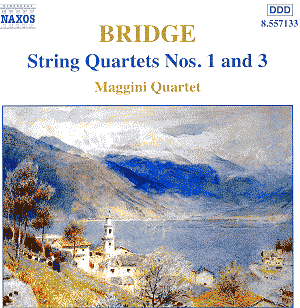The Magginis have plundered some more treasures
from the vaults of early twentieth century British chamber music
with this Naxos release of the first and third quartets of Frank
Bridge. Increasingly Bridge is being performed and recorded as
a composer in his own right as opposed to being the teacher that
Benjamin Britten visited at Friston, in Sussex for private composition
lessons.
All four string quartets that Bridge produced
are well regarded and closely trace his development as a composer.
The first quartet from 1906 is a dark late-romantic work but not
written in the pastoral style associated with the quartets of
his contemporaries such as Howells, Delius and Vaughan Williams.
By contrast the third quartet of 1925-26 sees Bridge progressing
to a harmonic idiom approaching that of Bela Bartók and
Alban Berg.
The swiftly composed first string quartet is
titled the ’Bologna’ owing to its entry into a Bologna music competition.
It is a darkly emotional work infused with yearning and mystery
with an undercurrent of melancholy. This agitated quartet does
not sound like the work of a happy and contented man. There is
a sense that something important was concerning the composer at
the time.
In the third quartet Bridge writes with more
progressive techniques yet the work still retains a fine sense
of accessibility. The score is relentless in its activity and
keeps its intense emotions simmering away as if in a pressure-cooker.
If Bridge was passionate and romantic he certainly doesn’t display
it through this music. What is striking is how Bridge bottles
up what seems like anger and frustration in a work devoid of outward
love and joy, where the occasional episodes of calm are only brief
and unconvincing. The work ends on an unsettled note as if Bridge
has serious unresolved personal issues.
The players have full measure of the melancholy
and mysterious content present in the first quartet. Playing with
a great passion and control the Magginis are not afraid to play
extremely lento especially in the second movement Adagio.
The second quartet is equally wonderfully performed and for
me the highlight of the disc is the particularly eerie passage
in the second movement Andante on track 6 between points
3:45-5:20 which they play to perfection. The composer allows the
first violin little opportunity for solo display and keeps the
viola and cello engaged throughout allowing the Magginis to display
an equality of engagement with a real unity of performance.
With clear, crisp and dry sonics the players
are very closely focused, so much so that this listener could
almost hear the sound of the bows running along the strings as
if sat next to their music stands. Personally I would have preferred
to have heard these quartets with the Magginis a touch more recessed.
The Magginis are in top form and go from strength
to strength. Another sure-fire winner from the champion Naxos
stable.
Michael Cookson
see also review by Rob
Barnett
